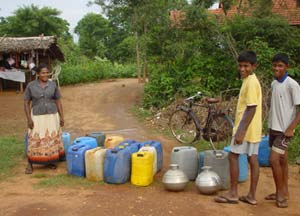UNDP: The world has 2.4 billion people who lack clean water
The United Nations Development Program (UNDP) has just released a report on the state of global living water and called on countries to boost investment to provide clean water to the people.
According to a report by UNDP, there are 2.4 billion people in the world not using clean water. Diseases related to drinking water are polluted, including cholera, causing more deaths than people dying of HIV / AIDS and malaria. More seriously, the number of children dying from lack of clean water is five times higher than the number of children dying of AIDS.

Water shortages occur in many parts of the world (Photo: watergovernance)
UNDP believes that the world needs to invest an additional $ 4 billion a year to provide clean water to people and this could help reduce the 20% mortality rate.
According to Kevin Watkins, the report's author, the world needs to consider larger measures to cope with global water shortages. In many major European cities, the concern, treatment and supply of clean water was made 100 years ago. However, diseases such as cholera (due to dirty water) are still attacking both rich and poor countries.
Mr. Watkins calls the current status ' water discrimination ' with richer countries less affected by drinking water.
Meanwhile, in the world's poorest countries, people still have to pay to buy clean water from private suppliers. Water prices are in Nairobi, Kenya, much more expensive than in London or New York. Poor people in Latin America must also spend more than 10% of their family income on running water.
The UNDP report does not claim that the country will be a major security threat, at risk of ' water war ' as many predicted.
However, UNDP warns of serious consequences without a major strategy for water use, especially when the effects of global climate change reduce the cultivation capacity of the poorest countries themselves. gender.
- Every year 1.8 million children die from lack of clean water
- More than one billion people lack clean water by 2050
- The reason why more than 2 billion people are about to have no clean water to use
- 50% of the world's population lacks fresh water by 2050
- This small invention will save millions of people around the world from a lack of clean water
- What solution to have enough water for 9 billion people on Earth?
- Places with the most expensive clean water in the world
- Terrifying images of the situation of depleting clean water all over the world
- The new invention using graphene creates clean water from polluted seawater in a simple step
- Clean water with a photovoltaic bag
- 1.1 billion poor people on Earth will be saved by this extremely significant invention
- Find clean water sources: from small projects
 Is the magnetic North Pole shift dangerous to humanity?
Is the magnetic North Pole shift dangerous to humanity? Washington legalizes the recycling of human bodies into fertilizer
Washington legalizes the recycling of human bodies into fertilizer Lightning stone - the mysterious guest
Lightning stone - the mysterious guest Stunned by the mysterious sunset, strange appearance
Stunned by the mysterious sunset, strange appearance